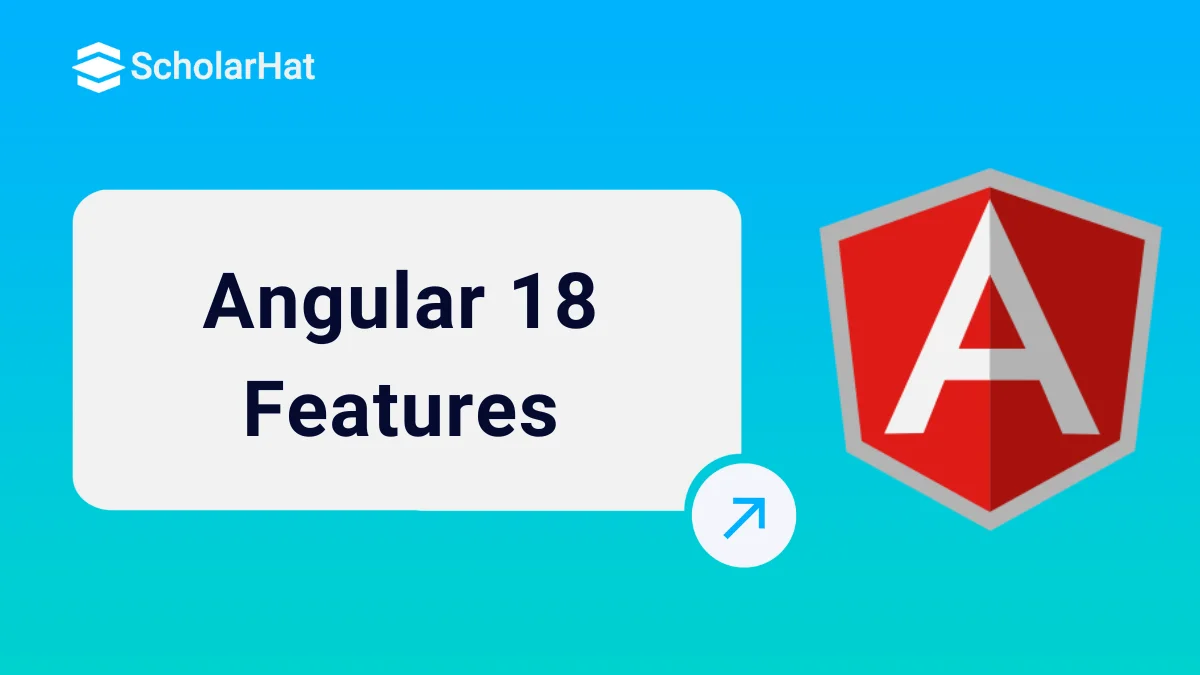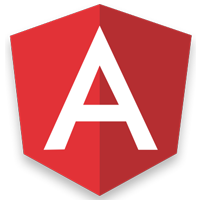13
FebLatest Angular 18 Features: What’s New and Improved?
Angular 18
Do you know about the latest Angular version release? Aren't you excited for the release of Angular 18? Angular 18 is on the verge of releasing this month. Like every previous version, this version will also be full of enhancements and optimizations. Though there hasn't been any official update regarding the features of Angular 18, there are some of them Angular is working on. There may be many more we'll get to hear in the coming days till the version comes out.
In this Angular tutorial, we'll discuss some of the features expected to come up with the release of Angular 18.
Read More: Top 50+ Angular Interview Questions & Answers
Discover the Angular 18 New Features
1. Route Redirects with Functions
Angular 18 introduces a new feature for managing redirects. Now strings can be replaced with functions to specify the redirect URL within the redirectTo property of the Route object. This feature increases the flexibility in routing and opens up new possibilities.
This function lets you access the object containing information about the URL. The “url” object contains all information about the route, including its data, title, query parameters, routing segment, and more. The function must return a reference to the string or an UrlTree. Do you know about UrlTree? It is a data structure representing a URL. It’s essentially a parsed representation of a URL that Angular’s router uses to navigate within an application.
//
export const routes: Routes = [
{
path: 'page1',
redirectTo: '/page2',
pathMatch: 'full'
}
];
//redirectTo function
export const routes: Routes = [
{
path: 'page1',
redirectTo: (url) => {
return '/page2';
},
pathMatch: 'full'
}
]; The UrlTree encloses information like the URL’s segments, query parameters, and fragments. This process is used in Angular’s routing system for various applications like URL manipulation, navigation, and routing guards. By using UrlTree, Angular ensures consistent and reliable navigation behavior within applications.
Read More: Routing in Angular
2. New RedirectCommand
The new RedirectCommand class in the upcoming release will manage NavigationExtras. This feature will enhance redirection capabilities within Guards and Resolvers. Integrating the RedirectCommand class significantly enhances maintainability and flexibility, simplifying the management of complex navigation patterns in Angular applications.
const route: Route = {
path: 'page1',
component: PageComponent,
canActivate: [
() => {
const router: Router = inject(Router);
const urlTree: UrlTree = router.parseUrl('./page2');
return new RedirectCommand(urlTree, { skipLocationChange: true });
},
],
};
Read More: Angular 17 Tutorial: What's new in Angular 17
3. ng-content default content
In this release, you can insert default content into the ng-content tag. In Angular, ng-content is a directive used to create a placeholder in a component's template where content can be dynamically inserted. This newly added feature is a logical extension of the ng-content element. If there’s a tag for content, it follows that default content should be included within the tag itself.
<div>
<h1>Header</h1>
<ng-content>Default</ng-content>
</div>
Read More: A Look into Angular Directives
4. Zoneless applications
Angular 18 has introduced improved support for "zoneless" applications. Zoneless applications eliminate the reliance on zone.js for change detection, offering several benefits such as improved performance, reduced complexity, and more explicit control over change detection.
One of the primary objectives of Signals is to enable applications to operate without zone.js. Initially, this would have been achievable solely through Signal Components. However, the landscape has since evolved. Now, it will be possible to achieve this without using Signal Components
5. TypeScript 4.7 Support
Angular 18 has the complete support of TypeScript 4.7. There will be an add-on in the characteristics of it in this release. Below are the enhancements that one can now leverage in Angular 18.
1. Template Literal Types
Now, you can precisely specify template types and catch errors easily and accurately.
2. Improved Readonly Support
It will introduce a more consistent and secure way to use the readonly keyword providing developers with efficiency and security benefits.
3. New Import Types
This will help you in creating a modular and organized code enhancing readability and efficiency.
6. Improved Performance with Ivy
This release will make specific optimizations to the Ivy compiler thereby enhancing the performance of various Angular applications. The optimizations will significantly lead to:
- Faster startup times
- Smaller bundle sizes
- Better overall performance
7. New ng-template API
With the arrival of ng-template API in Angular 18, developers can create and use templates without facing any difficulty. It has eased the process of template application. The following are the advantages of this API:
- Enhanced Type Safety: You can add more precise type definitions within templates. It helps in catching errors at compile time.
- Cleaner Code: Encourages more declarative, readable, and maintainable code.
- Enhanced Reusability: Simplifies the creation of reusable components with well-defined types.
8. Enhanced Forms API
It's now going to be simpler for the users to create and validate forms due to the additions going to happen in the forms API with the release of Angular 18. Now, the users will have more control over the form validation process in the following manner:
- Better Form State Management: Enhanced methods for managing and tracking the state of forms, including pristine, dirty, touched, and untouched states.
- Async Validation Improvements: Improved support for asynchronous validators, enabling more efficient handling of async validation logic.
- Better Support for Dynamic Forms: Improved capabilities for creating and managing dynamic forms that change based on user interaction or other factors.
- Streamlined API: A more intuitive and streamlined API that simplifies the creation and management of reactive and template-driven forms. It gives you the leisure to define validation rules and manage the validation process
Read More:
9. Improved Debugging Tools
Now no more headaches with the head-eating bugs. There are some advanced debugging tools introduced in the Angular 18 release. With the help of these, you can efficiently debug and test your Angular applications. You'll get to know in detail the application state with the help of these advanced tools which wasn't possible earlier.
Some of the expected enhancements include:
- Advanced Performance Profiling
- Tools to measure application performance, detect bottlenecks, and optimize performance.
- Profiling of component rendering times and change detection cycles.
- Source Maps and Debugging
- Improved support for source maps to facilitate better debugging in development environments.
- Easier correlation between transpiled code and source code.
- Dependency Injection (DI) Debugging
- Tools to trace and visualize dependency injection hierarchies.
- Enhanced error messages for DI-related issues, helping to resolve injection errors quickly.
Read More: Dependency Injection in Angular
10. Improved AOT Compilation
A more impactful AOT Compilation for larger apps will be inculcated in the newer release of Angular. Due to its support for third-party libraries, the apps will no longer require runtime compilation. There's also a possibility of having preloaded modules running in the background. There will be improvements in lazy loading and signal-based inputs.
11. Application Optimization
As a developer, you will want your application to load quickly, take less memory space, be user-friendly, etc. Even for a user, these parameters hold for a good application. Angular 18 is expected to come up with some optimizations in its new release. Let's have a look at some of them.
1. Improved Change Detection with New Reactivity Model
The new model simplifies state management, offering clearer patterns for handling complex application states and interactions. Developers benefit from a more intuitive and streamlined approach to reactive programming, leading to cleaner and more maintainable codebases.
2. Default Hybrid Rendering
Default hybrid rendering leverages both server-side rendering (SSR) and client-side rendering (CSR) by default. This hybrid approach optimizes performance by rendering initial content on the server and then enhancing interactivity on the client, providing a fast and smooth user experience. It positions Angular applications for future scalability and growth.
Read More: Tips to Optimize Your Angular App/Application
12. Modernized Unit Test Tooling
The unit testing setup process has been streamlined with simplified configuration options, making it easier for developers to set up and customize their testing environments. Integration with modern testing frameworks such as Jest or Cypress allows developers to leverage the latest features and capabilities for testing Angular applications.
13. Component Accessibility
Angular 18 introduces built-in accessibility features, making it easier for developers to create accessible components out of the box without additional configuration.
Read More:
- Angular Roadmap to Become an Angular Developer
- Angular Developer Salary In India 2024
- How Long Does it Take to Learn Angular?
Summary
We have described some of the expected characteristics of Angular 18. To get a grasp on upcoming features, you need to have a strong hold on Angular 17. Remain in touch with us to stay updated with the latest trends in Angular. You can even explore Angular 18 features by yourselves and analyze how they will impact the Angular community.
FAQs
Take our Angular skill challenge to evaluate yourself!

In less than 5 minutes, with our skill challenge, you can identify your knowledge gaps and strengths in a given skill.












